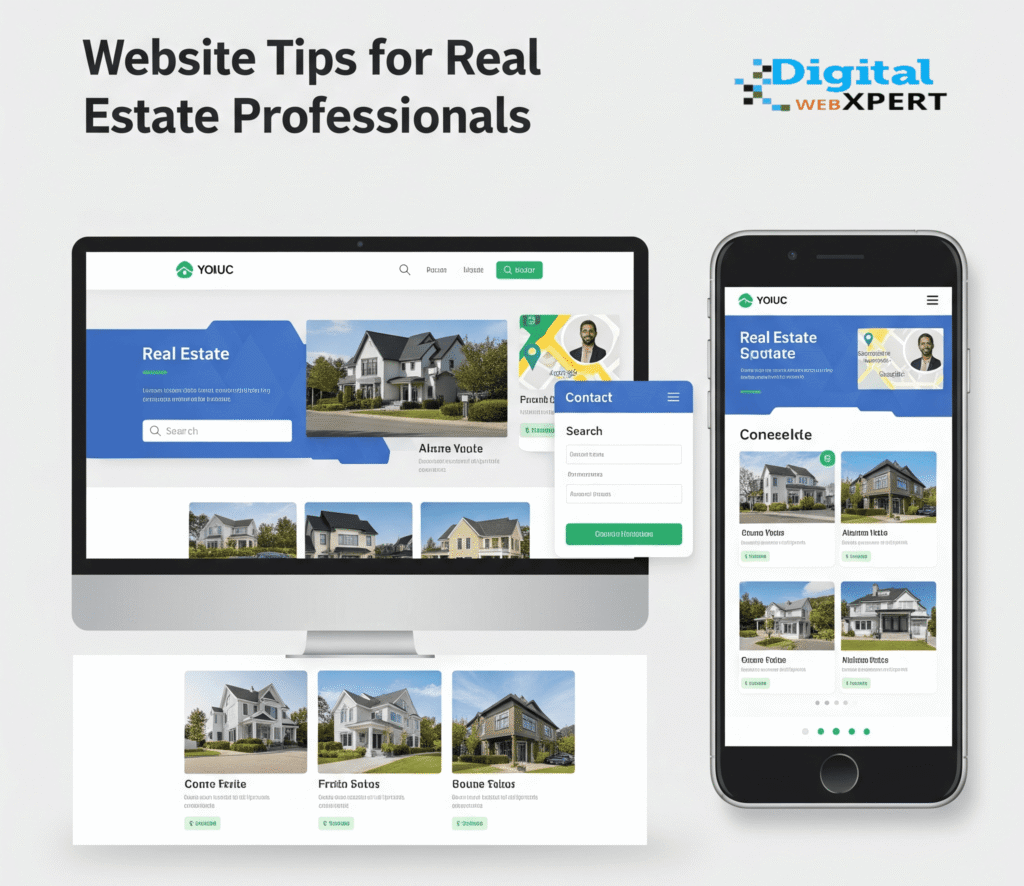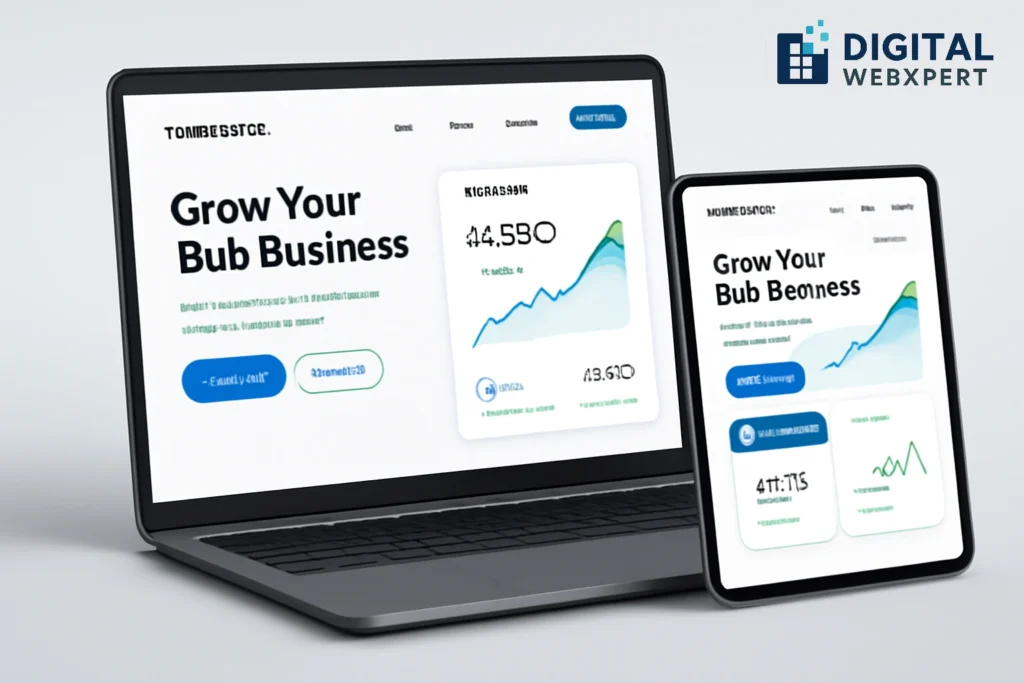In today’s digital-first housing market, your website is often the first interaction a potential buyer or seller has with your real estate business. That’s why implementing the right website tips for real estate professionals is more important than ever in 2025.
With more than 90% of homebuyers starting their journey online, your real estate website needs to be more than just a digital brochure—it must build trust, showcase listings, and capture leads effectively.
In this post, we’ll explore actionable website tips for real estate professionals that help you stand out, generate more leads, and stay ahead in a competitive market.
1. 🧭 Optimize for Local SEO (Location is Everything)
As a real estate professional, you need to show up in local search results—that’s where buyers are searching.
Tips:
Include your target cities, neighborhoods, and ZIP codes in titles, content, and meta descriptions.
Create dedicated landing pages for different areas you serve (e.g., “Homes for Sale in Salt Lake City”).
Use Google Business Profile and local schema markup.
Why it matters: Local SEO ensures your website appears when someone searches for “homes for sale near me” or “best realtor in [City].”
2. 📲 Mobile-Responsive Design Is Mandatory
Over 65% of real estate searches happen on mobile devices. If your site isn’t optimized for phones and tablets, you’re losing leads.
Key mobile features:
Click-to-call buttons
Fast-loading listing images
Responsive IDX listing search
Mobile-friendly contact forms
Pro tip: Use Google’s Mobile-Friendly Test to check your site.
3. 🏡 Integrate IDX Listings with Smart Filters
IDX (Internet Data Exchange) integration lets your visitors search real-time MLS listings directly from your website.
Best practices:
Use advanced filtering (price range, neighborhood, square footage)
Allow users to save searches or sign up for email alerts
Display high-resolution photos and Google Maps location previews
Having a robust IDX system is one of the most effective website tips for real estate professionals who want to retain users and convert them into leads.
4. 📸 Use High-Quality Visuals (Photos, Videos, and Virtual Tours)
Real estate is visual. Great images and videos sell homes faster.
Include:
Professional listing photos
Drone shots for property views
360° virtual tours for premium listings
Video walk-throughs uploaded to YouTube and embedded on your site
Pro Tip: Create an interactive gallery page sorted by location or property type.
5. 📥 Add Strong Calls-to-Action (CTAs) for Lead Capture
Don’t just show listings—encourage visitors to take action.
Effective CTAs:
“Schedule a Viewing” buttons on every property page
“Download Our Free Home Buyer Guide” popups
“Get Your Home’s Value” lead magnet form
Sticky “Contact Us” buttons for mobile users
The goal is to convert traffic into qualified leads you can follow up with.
6. 👤 Highlight Your Personal Brand and Testimonials
People buy from people. Your website should showcase who you are and why clients trust you.
Essentials:
Professional headshots
Realtor bio with credentials and area expertise
Video testimonials from happy clients
A dedicated “Why Work With Me” page
Trust Tip: Add logos of associations (NAR, MLS) or awards to build credibility.
7. 📈 Showcase Market Data and Neighborhood Guides
Buyers and sellers want to understand the market before making decisions.
Smart additions:
Blog posts with monthly market updates
Downloadable PDF neighborhood guides
Interactive maps showing schools, parks, and shops
Real-time mortgage calculators
Providing valuable data builds trust and positions you as a knowledgeable real estate expert.
8. 🔒 Ensure Your Website is Secure (SSL & Backups)
Security and trust go hand in hand, especially when visitors submit contact forms.
Must-haves:
SSL certificate (HTTPS)
GDPR-compliant contact forms
Daily backups and malware protection
A visible privacy policy and terms of service
Pro Tip: Use a managed WordPress host that includes security features.
9. 🧠 Content Marketing Drives Organic Traffic
A blog or resources section helps you rank on Google and offer value.
Content ideas for real estate websites:
“10 Things to Know Before Buying Your First Home in [City]”
“Pros & Cons of Living in [Neighborhood]”
“Selling a Home in 2025? Here’s What to Expect”
“Top Real Estate Investment Tips for Beginners”
Why it works: SEO + helpful content = free, long-term traffic.
10. ⚙️ Use CRM & Email Integration to Follow Up
Capture leads is step one—nurturing them is where conversions happen.
Essential tools:
Email sequences for new subscribers
Appointment scheduling tool integration (like Calendly)
This automation makes sure no lead falls through the cracks.
🔁 Recap: Top Website Tips for Real Estate Professionals
| Focus Area | Tip Summary |
|---|---|
| SEO | Optimize for local keywords & schema |
| Mobile Design | Ensure fast, responsive experience |
| IDX Integration | Smart, searchable listings on-site |
| Visual Content | Use professional photos, video, virtual tours |
| Lead Capture | Clear CTAs, forms, and buyer guides |
| Personal Branding | Include bios, awards, and testimonials |
| Market Insights | Share data, guides, and tools |
| Security & Compliance | SSL, privacy policies, backups |
| Content Marketing | Blog for SEO and education |
| CRM & Follow-Up Tools | Automate lead nurturing |
🎯 Final Thoughts
The most successful agents in 2025 will be those who treat their website as a marketing machine, not just a business card. These website tips for real estate professionals help you build trust, improve user experience, and—most importantly—generate more leads.
If you’re a realtor or broker looking to launch or revamp your site, Digital WebXpert can help you build a fast, SEO-friendly, and lead-focused website tailored for your market.
📞 Let’s talk strategy: https://www.digitalwebxpert.com/


